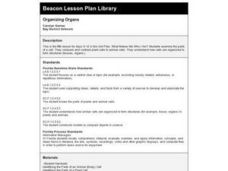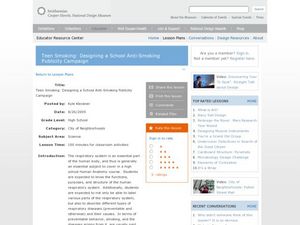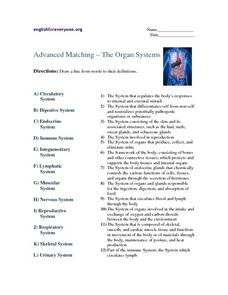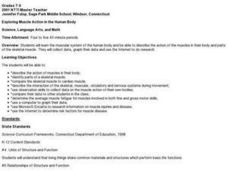Federal Reserve Bank
Why Scarce Resources Are Sometimes Unemployed
Why do markets operate inefficiently when the world's resources are so limited? Review the various types of unemployment that exist and why some resources, especially human resources, go unused.
Rice University
Biology for AP® Courses
An eight-unit electronic textbook provides a guide to AP® Biology. Each of the 28 chapters include an introduction, multiple lessons, a summary, review questions, and test prep questions. Teachers see how each lesson connects to a big...
Curated OER
Biology: Sun, Skin and Cancer
Students identify basic components of skin on a cross sectional diagram. They provide a basic description of cancer in terms of cell biology. Students explore the ABCD of skin cancer/mole evaluation and perform their own evaluation of...
Curated OER
The Living Environment
Sixth graders show what they know about plant and animal cells. In this cell project lesson, 6th graders get to choose a project based on their learning style. They can create a visual representation of cells, auditory forms, or build a...
Curated OER
DNA and Protein Synthesis in the Cell
Pupils explore how DNA fits into chromosomes and how chromosomes relate to the human body. They learn about DNA replication and protein synthesis and model these two processes in Web activities.
Curated OER
Fighting Infection
Students study immune responses and the structures that are related to immune cells functions. For this fighting infection lesson students construct antibody complexes and model the interaction of the immune system when it is fighting...
Curated OER
Organizing Organs
Fifth graders research plant and animals cells and create a Venn Diagram to show the similarities and differences.
Curated OER
Viruses
In this virus worksheet, 9th graders study the graph shown that illustrates the sizes of viruses, bacteria, and other structures. Then they state how large a red blood cell is and how large the smallest viruses are that affect plants....
Curated OER
Tissue Types
For this human tissue worksheet, students read about the 4 different tissue types in the body. Students read 4 pages about the types.
Curated OER
Genetics, Birth Disorders, and Pregnancy
Students in an alternative school setting for pregnant teens examine various facets of pregnancy including prenatal and postpartum testing, genetic influences, and additional risk factors. Through videos, hands-on activities, and small...
Curated OER
Building a Circulation City
Students identify the different organ systems found throughout the human body. Using a model, they explain and draw the flow of blood and name the parts of the circulatory system. They create their own circulation city in which to show...
Curated OER
Teen Smoking: Designing a School Anti-Smoking Publicity Campaign
Students review the human respiratory system and the effects on the human body. In this design lesson students brainstorm and create a prototype then present it to the class.
Curated OER
What is an Organism?
Sixth graders take a pre-test and summarize teacher's discussion of cells, tissues, organs in their notebooks. They read selections on organisms in their textbook and perform a dissection of a chicken drumstick with the thigh attached....
Curated OER
Sets of Chromosomes
In this chromosome activity, learners answer eighteen questions about chromatids, chromosomes, types of reproduction, haploid and diploid cells and zygotes.
Virginia Department of Education
Prokaryotes
Lead your biology class on a cell-sized adventure! Emerging scientists construct models of prokaryotes, then design an experiment to properly grow a bacterial culture. They conclude the activity by viewing the culture under a microscope....
American Physiological Society
Effects of Environment on Enzymes
Much like the tale of Humpty Dumpty, proteins, once altered, will never be the same again. Honors and pre-AP biology classes explore the delicate world of enzymes via a Webquest and lab experiment. The teacher's guide contains all...
Curated OER
Advanced Matching - The Organ Systems
What's the difference between the digestive system and the endocrine system? Explore 12 body systems in this anatomy matching worksheet, for which learners find descriptions corresponding to anatomical terminology. Some of the...
Curated OER
DNA AND PROTEIN SYNTHESIS IN THE CELL
Students explore the structure of DNA and the process of DNA replication, describe the process of protein synthesis, recognize the importance of proteins in the human body, and look at how mutations affect protein synthesis.
Curated OER
DNA: Structure and Replication Movie
In this DNA: structure and replication learning exercise, students fill in the blanks about the structure of DNA and replication of DNA. Students sketch several diagrams of DNA at different stages.
Curated OER
DNA and Protein Synthesis in the Cell
High schoolers explore how DNA fits into chromosomes and how chromosomes relate to the human body. Students learn about DNA replication and protein synthesis and model these two processes.
Curated OER
Cells and Cancer
Students idenitfy that cancer is a growth of mutated cells and that cancer cells are only one type of cell that causes disease in our body. They also identify that all eukaryotic cells contain a nucleus, cytoskeleton, and a cell...
Curated OER
Biotechnology
The intricate details of DNA structure and the double helix are covered in this presentation. Many details about chemical behavior are also explained which will help your students review DNA. Many of the slides are summaries and the 37...
Curated OER
Exploring Muscle Action in the Human Body
Students collect and graph data and use the internet to research the skeletal muscles.
Forest Foundation
The Nature of Trees
Young botanists examine the different parts of tress and then draw parallels between the functions of these parts and the function of parts of the human body.























